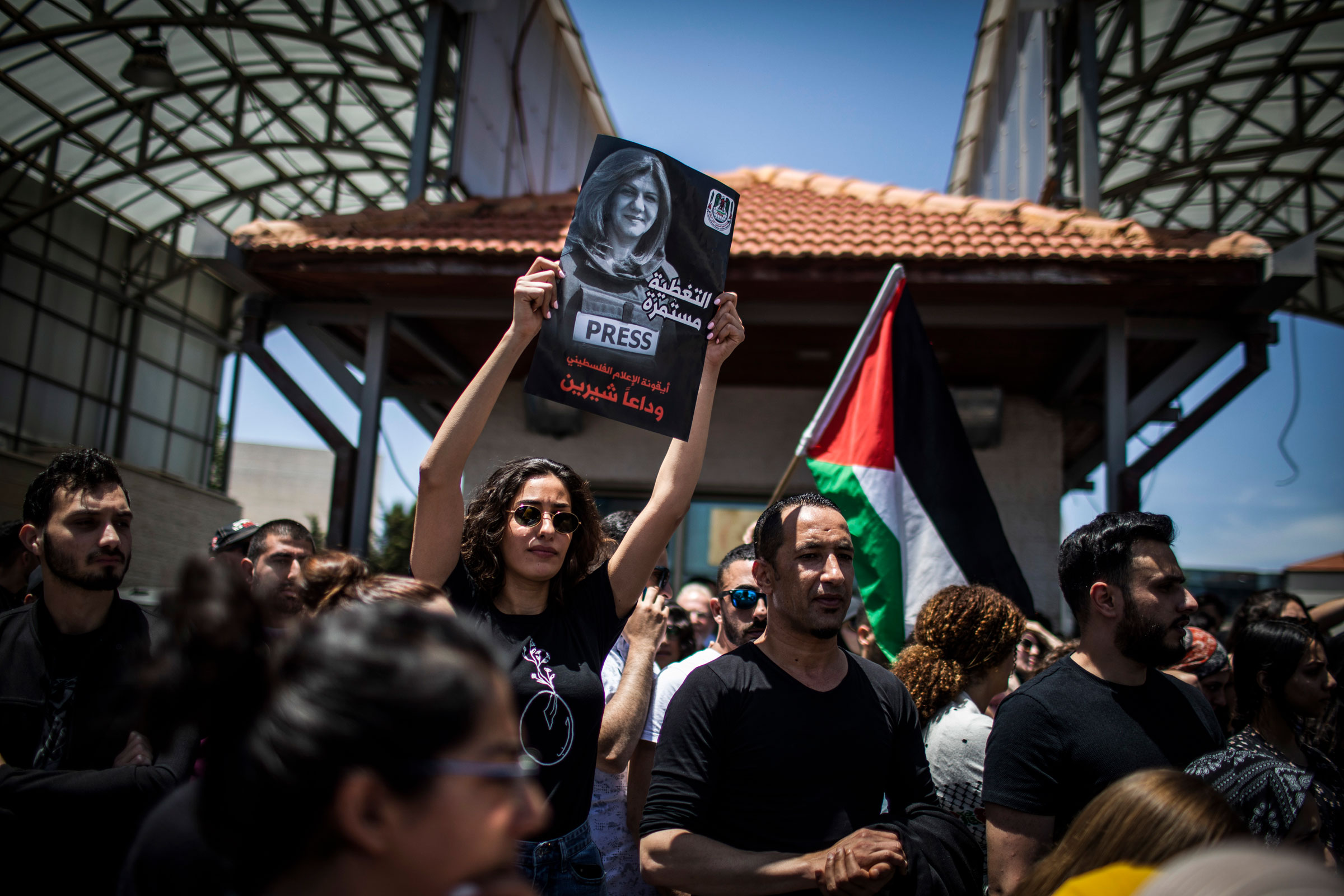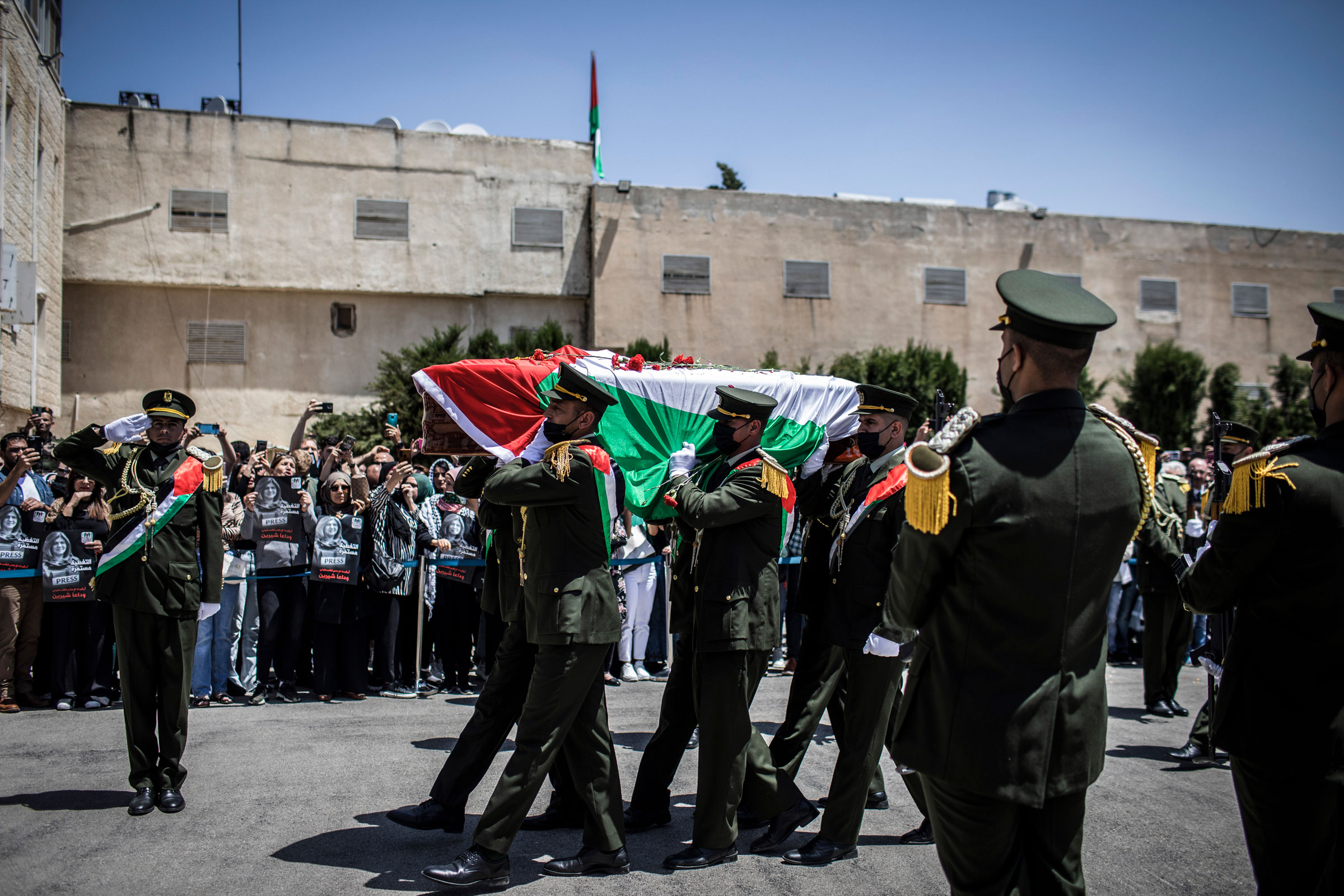
News broadcaster Al Jazeera accused Israel of “blatant murder” following the killing of one of its veteran journalists in the West Bank on Wednesday. Shireen Abu Akleh, a 51-year-old Palestinian-American correspondent for Al Jazeera Arabic, was shot dead while covering a raid by Israeli military and security forces of a refugee camp.
The killing has triggered global condemnation and grief at a time of increasing tensions in the West Bank and escalating violence. Abu Akleh’s death came just days after the publication of the 2022 World Press Freedoms Index which found that journalism is restricted and under threat in well over two thirds of the world.
Israeli forces have been accused of harassing Palestinian journalists covering the conflict in the region. Abu Akleh’s death brings the number of journalists killed in Israel and the Occupied Palestinian Territory since 1992 to 19. Following the news of Abu Akleh’s death, Israeli military spokesperson Ran Kochav described the journalist and her colleagues as “armed with cameras, if you’ll permit me to say so.”
What we know about Shireen Abu Akleh’s death so far
According to Abu Akleh’s employer Al Jazeera, which released a statement shortly after her death, she was reporting on the Israeli military’s operations at the Jenin refugee camp in northern West Bank on early Wednesday morning. There, she was shot in the head and taken to hospital in a critical condition, where she later died. Her producer Ali al-Samoudi, who was shot in the back, is reportedly undergoing treatment.
Although we know that Abu Akleh was killed, there are conflicting reports about who was responsible. Al Jazeera says that she was “assassinated in cold blood” by Israeli occupation forces, who “target[ed] her with live fire.” At first the Israeli military denied the allegation, but a Washington Post report on Thursday cited an official saying Israel was investigating whether the fatal shot came from its soldiers.
An earlier Israeli military statement hinted that Palestinian fighters were responsible for her death. It said that troops were defending themselves from “massive fire” in Jenin and that “there is a possibility, now being looked into, that reporters were hit—possibly by shots fired by Palestinian gunmen.”
But other journalists at the scene disputed this version of events. According to Al Jazeera, reporters on the ground said there were no Palestinian fighters present at the time of the killing.
“We were going to film the Israeli army operation and suddenly they shot us without asking us to leave or stop filming,” said al-Samoudi, Abu Akleh’s colleague who was wounded.
Video footage taken at the scene shows Abu Akleh wearing a press jacket identifying her as a journalist when she was shot.
Shatha Hanaysha, a journalist for Quds News Network who witnessed the killing, told the Guardian that Abu Akleh was shot in the head even though she was wearing a helmet. “So it is obvious that the one who shot her meant to hit an exposed part of her body,” Hanaysha said. “This is an assassination.”
Her legacy
Abu Akleh was renowned in the Arab world for her reporting on the Israeli-Palestinian conflict which has spanned more than three decades. Having joined the network in 1997, only a year after its launch, she covered many of the region’s historic flashpoints. These included the second intifadeh—a five year Palestinian uprising against Israel which began in 2000—the battle of Jenin in 2002 and the death of Yasser Arafat, President of the Palestinian National Authority, in 2004.
She was hailed as one of the leading authorities on events in the region, and praised for her commitment to spotlighting the stories of both Palestinians and Israelis. “Shireen was our voice. It is unbelievable,” Palestinian MP Khalida Jarrar told Al Jazeera.
Tamara Alrifai, a senior spokesperson for the United Nations Relief and Works Agency told the Guardian that Abu Akleh had been a fixture of the Palestinian story. “The fact that she has covered so many stormy events unscathed makes her death today even more shocking.”
Thousands of Palestinians attended a state service for Abu Akleh in the Palestinian city Ramallah held a day after her killing. Her coffin, draped in the Palestinian flag, was carried to a ceremony at the presidential compound.

Weeks of violence in the West Bank and Israel
Abu Akleh was killed on a reporting assignment during an Israeli raid which the military said was conducted to find Palestinian “terrorist suspects.” Israeli forces have stepped up the number of raids in the area in recent weeks, following a wave of attacks targeting Jewish Israelis that have left 19 people dead. The military operations have escalated the violence in Jenin, and 28 Palestinians and three Arab-Israelis have died.
Tensions are particularly high right now in other areas of Israel and Palestinian territories. Ongoing clashes at the Al Aqsa mosque compound in Jerusalem, which is considered holy by both Muslims and Jews, have left dozens of Palestinians injured. Last year, unrest in the compound triggered an 11-day war between Israeli forces and Hamas, the Palestinian militant group.
How Israeli and Palestinian authorities are responding
Following news of her death on Wednesday, President of the Palestinian Authority, Mahmoud Abbas, blamed Israel. He said her killing was “part of the occupation’s policy of targeting journalists to obscure the truth and commit crimes silently”.
Israeli Prime Minister Naftali Bennett initially denied Abbas’ allegations. “According to the information we have gathered, it appears likely that armed Palestinians—who were firing indiscriminately at the time—were responsible for the unfortunate death of the journalist,” he said in a statement after the news broke Wednesday.
On Wednesday afternoon, Israeli military chief Aviv Kohavi backtracked from earlier comments that sought to assign blame, saying: “it is not possible to determine whose shooting she was hit by and we are sorry for her death.”
Then, on Thursday the Washington Post reported a shift in the Israeli military’s stance. It is reportedly exploring the possibility that its soldiers were, in fact, to blame for the fatal shot.
The Palestinian Authority has so far declined a joint investigation with Israel. Officials have also refused to hand over the bullet which killed Abu Akleh to an Israeli laboratory due to concerns that Israeli officials would not be objective. Israel, on the other hand, says that the Palestinian Authority is trying to hide the bullet’s origin. Palestinian officials have conducted a post-mortem but have not yet released the results.
Speaking at the state ceremony for Abu Akleh, Abbas vowed to instead take the case to the International Criminal Court.
The U.N. Special Rapporteur on Palestine, Francesca Albanese, told Anadolu Agency that the journalist’s killing amounted to a “serious violation of international humanitarian law and is potentially a war crime under the Rome Statute of the International Criminal Court.”
What officials in the U.S. are saying
Both the White House and speaker of the House of Representatives Nancy Pelosi have condemned Abu Akleh’s killing and called for a thorough investigation.
“Congress is committed to the defense of press freedoms worldwide and protection of every journalist, particularly those in conflict zones,” Pelosi said in a statement.
U.S.-based Al Jazeera staff held one minute of silence outside the organization’s Washington bureau.
Journalists around the world are facing sustained threats to their effort to increase accountability and counter disinformation. According to the International Press Institute, Abu Akleh’s death brings the global toll of journalists killed in the field to 28 so far in 2022. On World Press Freedom Day May 3, Reporters Without Borders warned that global media polarization has increased two-fold over the past year.
More Must-Reads from TIME
- Why Biden Dropped Out
- Ukraine’s Plan to Survive Trump
- The Rise of a New Kind of Parenting Guru
- The Chaos and Commotion of the RNC in Photos
- Why We All Have a Stake in Twisters’ Success
- 8 Eating Habits That Actually Improve Your Sleep
- Welcome to the Noah Lyles Olympics
- Get Our Paris Olympics Newsletter in Your Inbox
Contact us at letters@time.com